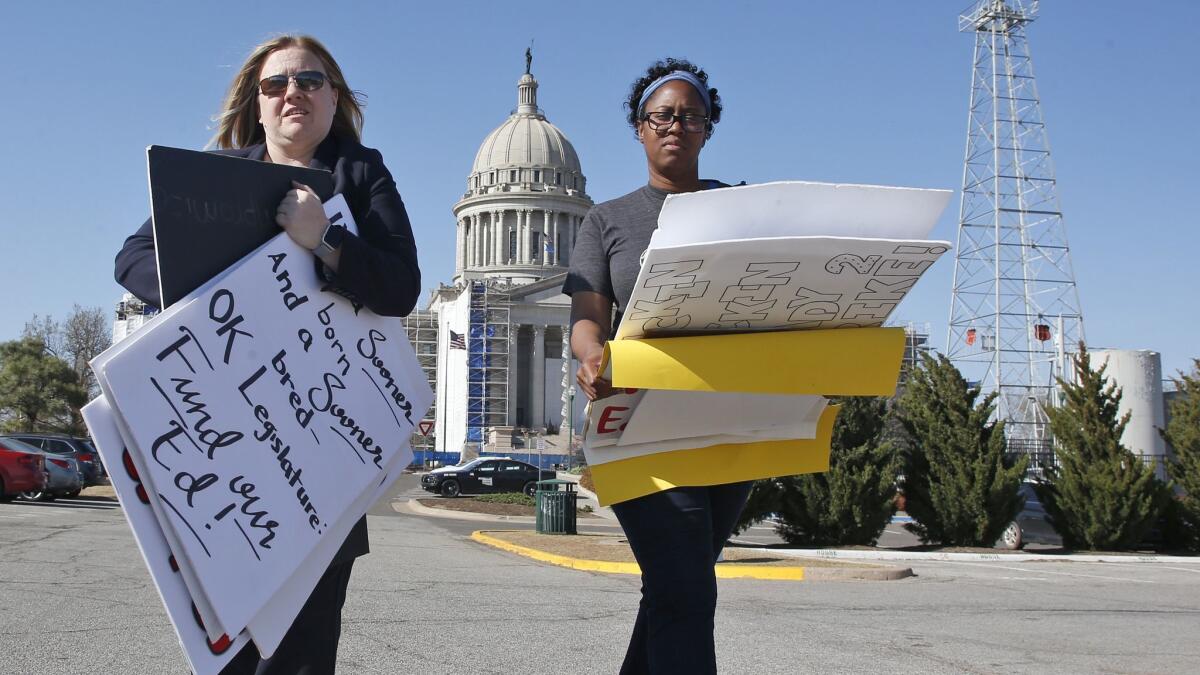Oklahoma teacher walkout winds down despite lawmakers’ failure to meet demands

Oklahoma’s largest teachers union has announced an end to a walkout that has drawn thousands of educators out of classrooms and to the state Capitol demanding greater investment in the state’s schools, which have endured the nation’s steepest funding cuts.
The announcement Thursday from the Oklahoma Education Assn. does not necessarily end the protests at the Capitol, as teachers not affiliated with the union vowed to stay longer. Instead of a walkout, the union and school districts across the state have said they plan to send delegations of teachers to Oklahoma City to keep the pressure on lawmakers. Teachers and their supporters have also promised to push education issues to the forefront of November elections, when the state chooses a new governor.
As school districts begin to reopen, the protests may lose steam. The Legislature is not in session Friday, and observers are waiting to see what happens Monday, when lawmakers return.
Alicia Priest, the union’s president, expressed disappointment that the effort — which began April 2 and caused about a half-million students to miss at least a day of school — did not yield better results.
“Despite tens of thousands of people filling the Capitol and spilling out over the grounds for nine days, we have seen no significant legislative movement since last Friday,” Priest said in a news release Thursday. “We recognize our formal efforts to lobby elected leaders have achieved all that we will accomplish this legislative session.”
The walkout in Oklahoma is part of a wave of teacher protests hitting states that have slashed school spending to make up for tax cuts and other blows to state revenue. Schools in Louisville, the largest system in Kentucky, planned to close Friday as thousands of teachers said they would be absent on the same day a major teacher rally is scheduled for the state Capitol in Frankfort.
The series of recent job actions began in West Virginia, where teachers won a 5% raise after shutting down schools for nine days. Their success catalyzed the movement in Oklahoma, which largely grew out of a Facebook page started by a 25-year-old middle school teacher from Stillwater. Kentucky teachers followed, shutting down some school districts to protest a pension bill signed by GOP Gov. Matt Bevin.
Now, teachers in Arizona, which ranks near the bottom in average teacher pay and has endured deep spending cuts, have threatened to walk out unless they get a raise and additional investments in schools.
Because of tax cuts and falling oil prices, Oklahoma’s revenue has cratered, forcing it to slash state education funding. Adjusted for inflation, spending per student has plummeted nearly 30% over the last decade, according to the left-leaning Center on Budget and Policy Priorities. The results have been stark for classrooms and educators: Oklahoma’s teachers are among the worst paid in the nation, and nearly 20% of schools moved to four-day school weeks to save money.
Last month, faced with the prospect of a walkout, Oklahoma lawmakers approved measures to raise teachers’ salaries an average of $6,100 a year, support staff pay by $1,250 and invest an additional $50 million in classrooms. It marked the first time in 10 years that state lawmakers had raised the teacher salary schedule. The package of bills included an increase in a production tax on oil companies.
The measure did not meet the teachers’ demands for a $10,000 raise for themselves, a $6,000 raise for support staff and $200 million in additional classroom funding. Teachers said the $50 million in additional classroom funds would foster little change once it was distributed statewide. It would not enable districts with four-day school weeks to return to five.
Teachers converged on the state Capitol by the tens of thousands beginning last week, shuttering schools across the state. Some schools reopened on the walkout’s second day, and several more reopened this week. But the state’s two largest school districts — in Tulsa and Oklahoma City — announced they will remain closed Friday.
The Legislature did not commit additional money to education during the walkout. But the teachers’ raucous presence may have pushed lawmakers to pass two bills to raise additional state revenue, giving schools greater assurance the state will deliver on its funding commitments.
Together, the measures — which expand the number of online purchases subject to state sales tax and allow ball-and-dice games in the state’s tribal casinos — are projected to bring in more than $40 million in revenue.
Education groups applauded the progress. Between the raises and the additional classroom investments, the state will spend about $500 million more on education.
“Investing in education and ensuring elected officials are committed to public education must be the new normal for Oklahoma, and I believe Oklahomans are committed to a future that’s much better than our past. Today isn’t the endgame for our children, our teachers or our schools,” said Shawn Hime, executive director of the Oklahoma State School Boards Assn. “It’s a new beginning.”
More to Read
Sign up for Essential California
The most important California stories and recommendations in your inbox every morning.
You may occasionally receive promotional content from the Los Angeles Times.










